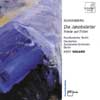Schoenberg (Die) Jakobsleiter
An admirable team capture the burning intensity of a bold, ambitious conception
View record and artist detailsRecord and Artist Details
Composer or Director: Arnold Schoenberg
Genre:
Vocal
Label: Harmonia Mundi
Magazine Review Date: 5/2004
Media Format: Super Audio CD
Media Runtime: 60
Mastering:
Stereo
DDD
Catalogue Number: HMC80 1821

Tracks:
| Composition | Artist Credit |
|---|---|
| Friede auf Erden |
Arnold Schoenberg, Composer
Arnold Schoenberg, Composer Berlin Deutsches Symphony Orchestra Kent Nagano, Conductor |
| (Die) Jakobsleiter |
Arnold Schoenberg, Composer
Anett Taube, Soprano Arnold Schoenberg, Composer Berlin Deutsches Symphony Orchestra Berlin Radio Chorus Dietrich Henschel, Baritone Georg Taube, Tenor Heidi Meier, Soprano Isabelle Vosskühler, Soprano James Johnson, Baritone Jonas Kaufmann, Tenor Kent Nagano, Conductor Kurt Azesberger, Tenor Michael Volle, Baritone Salomé Kammer, Soprano Stephan Rügamer, Tenor Ulrich Lön, Tenor |
Author: Arnold Whittall
Schoenberg’s burning desire to do philosophical justice to those complex religious questions which preoccupied him for so long might not have left him with insoluble compositional problems, but it certainly didn’t help him to finish his large-scale musical attempts to tackle those questions. The non-completion of Die Jakobsleiter can be ascribed in part to such mundane factors as being called up for military service in 1917: yet it’s hard not to feel that Schoenberg needed to leave the oratorio unfinished, as a symbol of man’s eternally frustrated aspiration to grasp ultimate truths while still alive.
The mixed messages that result from the composer’s copious draftings, and occasional later efforts, to make what exists of the work performable, mean that no text can claim absolute authenticity, and scholars continue to debate the strengths and weaknesses of the version by Winfried Zillig (revised by Rudolf Stefan) which was first published in 1980. Pierre Boulez used this as the basis for a recording which, despite some excellent individual performances, couldn’t entirely conceal the conductor’s lack of empathy with Schoenberg’s heady brew of Balzac, Strindberg and Swedenborg. Kent Nagano and his admirable team capture the music’s combustible intensity as well as its high-flown spirituality, despite preferring a higher degree of song to ‘song-speech’ (Sprechgesang) than the composer probably wanted. But – listening to the ordinary CD version – I’m not persuaded that the way the soul soars free in the final stages, with a simplicity that any present-day Holy Minimalist could identify with, is a convincing outcome to the turbulent soul-searchings which precede this moment of release.
Characteristically, Schoenberg has left us with the problem rather than the solution, but Schoenbergian problems never fail to absorb the listener, and this well-integrated and effectively recorded reading is a worthy attempt at one of the composer’s boldest and most ambitious conceptions. Topping and tailing the oratorio-fragment with Friede auf Erden brings the enterprise gently down to earth. Both the orchestral arrangement and the a cappella choral version are done here with all the necessary fervour.
The mixed messages that result from the composer’s copious draftings, and occasional later efforts, to make what exists of the work performable, mean that no text can claim absolute authenticity, and scholars continue to debate the strengths and weaknesses of the version by Winfried Zillig (revised by Rudolf Stefan) which was first published in 1980. Pierre Boulez used this as the basis for a recording which, despite some excellent individual performances, couldn’t entirely conceal the conductor’s lack of empathy with Schoenberg’s heady brew of Balzac, Strindberg and Swedenborg. Kent Nagano and his admirable team capture the music’s combustible intensity as well as its high-flown spirituality, despite preferring a higher degree of song to ‘song-speech’ (Sprechgesang) than the composer probably wanted. But – listening to the ordinary CD version – I’m not persuaded that the way the soul soars free in the final stages, with a simplicity that any present-day Holy Minimalist could identify with, is a convincing outcome to the turbulent soul-searchings which precede this moment of release.
Characteristically, Schoenberg has left us with the problem rather than the solution, but Schoenbergian problems never fail to absorb the listener, and this well-integrated and effectively recorded reading is a worthy attempt at one of the composer’s boldest and most ambitious conceptions. Topping and tailing the oratorio-fragment with Friede auf Erden brings the enterprise gently down to earth. Both the orchestral arrangement and the a cappella choral version are done here with all the necessary fervour.
Discover the world's largest classical music catalogue with Presto Music.

Gramophone Digital Club
- Digital Edition
- Digital Archive
- Reviews Database
- Full website access
From £8.75 / month
Subscribe
Gramophone Full Club
- Print Edition
- Digital Edition
- Digital Archive
- Reviews Database
- Full website access
From £11.00 / month
Subscribe
If you are a library, university or other organisation that would be interested in an institutional subscription to Gramophone please click here for further information.




